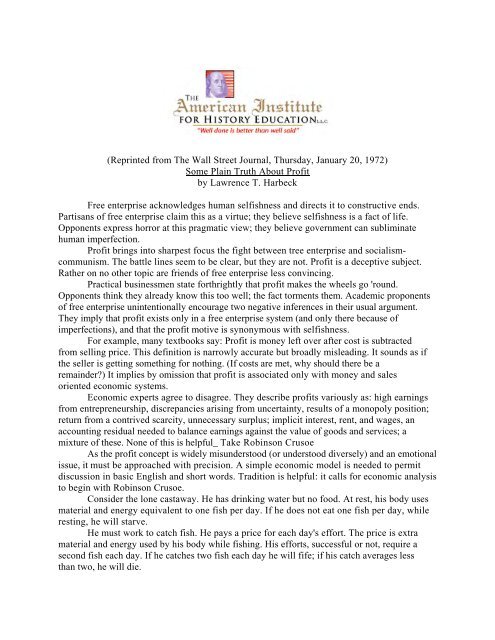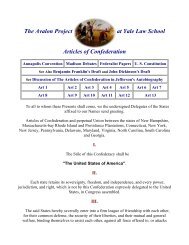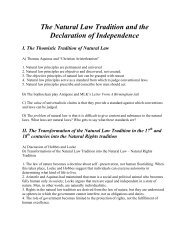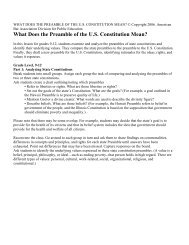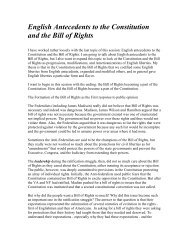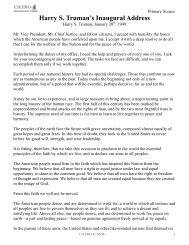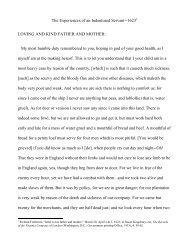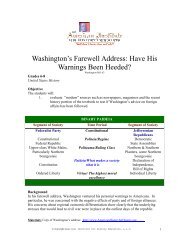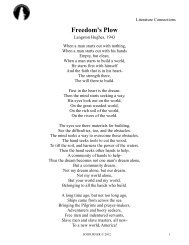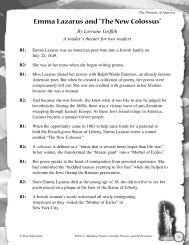Economic Development - American Institute For History
Economic Development - American Institute For History
Economic Development - American Institute For History
You also want an ePaper? Increase the reach of your titles
YUMPU automatically turns print PDFs into web optimized ePapers that Google loves.
(Reprinted from The Wall Street Journal, Thursday, January 20, 1972)Some Plain Truth About Profitby Lawrence T. HarbeckFree enterprise acknowledges human selfishness and directs it to constructive ends.Partisans of free enterprise claim this as a virtue; they believe selfishness is a fact of life.Opponents express horror at this pragmatic view; they believe government can subliminatehuman imperfection.Profit brings into sharpest focus the fight between tree enterprise and socialismcommunism.The battle lines seem to be clear, but they are not. Profit is a deceptive subject.Rather on no other topic are friends of free enterprise less convincing.Practical businessmen state forthrightly that profit makes the wheels go 'round.Opponents think they already know this too well; the fact torments them. Academic proponentsof free enterprise unintentionally encourage two negative inferences in their usual argument.They imply that profit exists only in a free enterprise system (and only there because ofimperfections), and that the profit motive is synonymous with selfishness.<strong>For</strong> example, many textbooks say: Profit is money left over after cost is subtractedfrom selling price. This definition is narrowly accurate but broadly misleading. It sounds as ifthe seller is getting something for nothing. (If costs are met, why should there be aremainder?) It implies by omission that profit is associated only with money and salesoriented economic systems.<strong>Economic</strong> experts agree to disagree. They describe profits variously as: high earningsfrom entrepreneurship, discrepancies arising from uncertainty, results of a monopoly position;return from a contrived scarcity, unnecessary surplus; implicit interest, rent, and wages, anaccounting residual needed to balance earnings against the value of goods and services; amixture of these. None of this is helpful_ Take Robinson CrusoeAs the profit concept is widely misunderstood (or understood diversely) and an emotionalissue, it must be approached with precision. A simple economic model is needed to permitdiscussion in basic English and short words. Tradition is helpful: it calls for economic analysisto begin with Robinson Crusoe.Consider the lone castaway. He has drinking water but no food. At rest, his body usesmaterial and energy equivalent to one fish per day. If he does not eat one fish per day, whileresting, he will starve.He must work to catch fish. He pays a price for each day's effort. The price is extramaterial and energy used by his body while fishing. His efforts, successful or not, require asecond fish each day. If he catches two fish each day he will fife; if his catch averages lessthan two, he will die.
If he catches a third fish one day, it is profit. He can afford to rest the next day andnot fish at all. Or, he can keep working and save his extra fish for the day when he gets lessthan two. Or he can start to build a supply to allow him to stop fishing, temporarily, and makea net to improve his productivity. The extra fish, the profit, gives him the option of doingsomething other than fishing.Time is a factor in measuring profit. The preceding discussion defines it over a 24-hour day. We can also define it as occurring only during production,' and conclude that thecastaway makes a profit of one fish every eight-hour working day that he catches two. It giveshim the option of not fishing at night. The significant point is this: During a productive period,however defined, he produced more than he consumed.Profit is the difference between production and consumption of the producing unit--while it is producing.All living things and all organizations of living things must be profitable to exist.Bears, squirrels, and trees must make a profit in the summer to survive the winter and startproducing again next spring. Life survives unprofitable periods only if production exceededconsumption during an earlier period.Profit achieved during eight hours enables the worker to not work the remaining sixteenhours of the day. The worker's profits permit his children to not work at all. Profit during goodtimes, if not all removed, enables a business and the jobs it provides to continue during badtimes.Profit is needed to start an enterprise. A new business, a bear cub, and a plant seedowe their lives to profits generated before their birth. They could not come into existence, orcontinue to exist at first while still unprofitable, unless some other producer first generated aprofit.Profit should not be confused with savings. Living things must save, if only in theform of fat, to survive profitless periods. But before they can save they must profit.The real argument between free enterprise and socialism-communism is not aboutprofit per se; all systems must profit to exist. The contentious issues are these Who producesit? Who gets it? How is it used? How are these decisions reached?Opinions on these questions should be developed and evaluated in the bright light of oneglaring fact: no one gets it if there isn't any. Profit must precede allocation. It is pointless togive food stamps to poor people if farmers don't produce more food than farmers eat. Personsin government can't 'give" a subsidy to an unprofitable activity unless they are first able to takea profit from some other enterprise.The total subsidy of some units of an economic system cannot exceed the profits of the others.This hard fact applies equally to the castaway, families of bears, the U.S., and all other nationsno matter what their economic and political structure. (Nations living on the international doleare not exceptions; they are parts of larger economic systems.)The finer things in life-- sports, vacations, better homes, art, etc.- and the "free" things- welfarepayments, low cost (to the user) government housing, foreign aid, etc.- are possible only ifprofits occur first. It seems reasonable, therefore, that current profits should be distributed in amanner designed to encourage the continued and increasing availability of future profits.To achieve this objective an economic system must take into account many things, including afew facts of human nature. Such as- You cannot destroy incentive. You cannot stop the superior individual's efforts to excel his
fellow men. With taxes, laws, and regulations you may be able to destroy his incentive to make aprofit, but this forces him to express his superiority through less productive actions.- People expect to benefit directly and commensurately from their own productivity. Within thelimits of their profitability they provide for their families. Few are willing to give a large share oftheir profit to strangers- Saints appear from time to time, but most of us do not qualify. Organizations based on theassumption that humans are saintly, or can be taught or legislated to be saintly, do not functionas planned. They change, or cease to exist. Often they become totalitarian in an effort to forcepeople to be saintly.- Precisely half the people are below average in ability. As a group, they produce much less thanhalf of total profit. They are willing but unable. These underachievers must be given a greatershare of profit than they produce or, in their frustration, they will diminish or destroy totalprofitability. They can do this by vote or direct action. They are not stupid. Given a chance tounderstand the choice, they will elect to dine on 25% of a turkey rather than 50% of a sparrow.Free enterprise comes closer to balancing these and other items- many of them conflicting- and isthe most productive economic systemAn AnalogyIdealists who confuse profits and selfishness often follow this pattern They avoid profit-makingjobs, seek profit-using careers and clamor simultaneously for government action to preventothers from generating profits. The analogy would be to destroy part of the food and water in alifeboat because the rowers are getting larger shares than those who can not or will not help rowthe boat to safety_If somebody wants to help the poor he should start a new enterprise, or work with an existingone, to create more jobs and profits. The extra jobs and increased production will provide morehelp than will militant marching and loud-mouthed sympathy.'If a person hopes to use profits- asa government employee or social worker, for example-- he should be sure that his politicalactions do not discourage efficient producers from supplying the profits that permit him toappear altruistic. He should support the economic system that can best support him and those hewishes to help.Free enterprise is superior to socialism and communism in many ways, including profitability. Itis not superior because it is profitable, however, but because it is more profitable. Mr. Harbeck, amanagement consultant, lives in Ann Arbor.
,)IIGarrett Morgan Academy for Transportation and rechnologyUnited States <strong>History</strong>Dr. John E. Glark, Jr.Points I earned for PARTICIPATION today.NOTES: (75 points maximum)totafHoMwhat did I contribute to this day's tesson?How did my presence add to the rearning process in this class today?What impression of me did I give Dr. Clark today?


